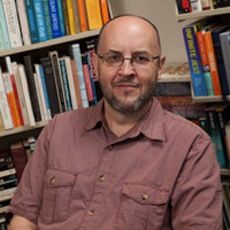Alan Jacobs is a distinguished professor of English at Baylor University and a leading Auden scholar. He is the editor of the Princeton critical editions of Auden’s long poems For the Time Being (1944) and The Age of Anxiety (1947), a noted C. S. Lewis biographer, and the author of numerous books and countless essays for a wide range of publications, from The Atlantic, First Things and The Christian Century to Harper’s and the Guardian. A self-described “evangelical Anglican,” he leans decidedly leftward on many issues — and is no advocate of force-fed “spiritual benzedrine” for anyone — but he can be hard to label politically. His most recent book is The Year of Our Lord 1943: Christian Humanism in an Age of Crisis (Oxford University Press, 2018). This interview is from the Los Angeles Review of Books (October 1, 2018) and is used by permission.
WEN STEPHENSON: I’ve always seen you as a theologically “orthodox” Christian intellectual who is neither of “the right” nor “the left.” Is that a fair description? How do you identify or describe yourself religiously, politically?
ALAN JACOBS: It’s not easy for me to do. Really, for me it’s a set of strivings, instead of a set of realized achievements. I do often say I’m a small-“o” orthodox Christian, in the sense that I believe in the great ecumenical creeds, the Nicene Creed, the Apostles’ Creed. I see those as the template of basic Christian orthodoxy over time. But also I’m an Anglican, almost my whole adult life — when I became a Christian in college, I really only spent a few years in kind of low-church evangelical congregations before I found the Episcopal Church and the Anglican tradition. If you’re an Anglican, you get habituated to living in the midst of difference. You come to discover that, even when people can sign on to that orthodoxy, there are still enormous differences on all sorts of issues, and you learn to live with that.
 |
As far as left and right goes, what I strive to be is what Cardinal Bernardin called the “seamless garment” Christian — the seamless garment of life. I try to be consistently pro-life. And what that means in practice, for instance, is that my wife Teri and I do support crisis pregnancy centers, and we also are involved with the Waco Immigrants Alliance. Whoever is marginalized, whoever is despised, whoever is being left behind by society, whoever is being ignored and demeaned and treated as less than fully human, or having inferior value, then for me those are the people that Christ calls us especially to minister to. And so that’s what I strive for. Of course I don’t achieve it, but that’s what I want to be.
And what that means is, I will freely admit to being scandalized by the number of abortions that there are in America — it grieves me, it breaks my heart. But my heart is also broken by what my government is doing to immigrants right now. And my heart is broken by what now appears to be the everlasting legacy of white supremacy. It’s broken by people who, in the richest country in the history of the world, do not have health care. There’s just no excuse for that. So that’s what I try to do — to promote life wherever it is endangered, wherever it is marginalized, wherever it is demeaned. That’s the kind of Christian I want to be.
A lot of readers may remember your Harper’s essay “The Watchmen,” about the decline or disappearance of Christian public intellectuals from the mid-20th century to today, a topic that overlaps with your new book. And one of the things that got everybody’s attention in that essay was your gentle critique of Marilynne Robinson. I have to say, it reminded me of the way Christians — all sorts of religious believers, really — have a tendency to get into debates over whether or not the other is, you know, doing it wrong.
Oh, absolutely.
Do you think that traditionalist or orthodox Christian thinkers have a hard time accepting liberal Christians like Robinson as “serious,” or “real,” Christians? Or, as you implied, is that very much a two-way street?
It’s true, and it’s a complex point…
To continue reading click here.


